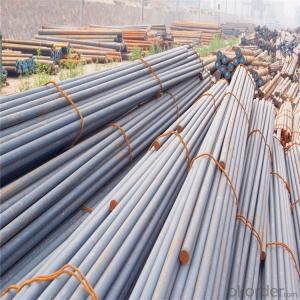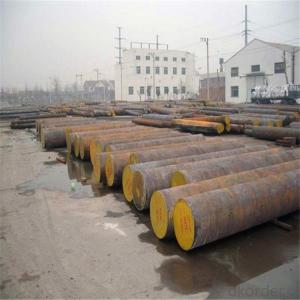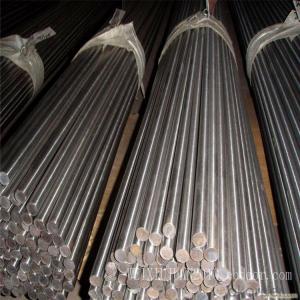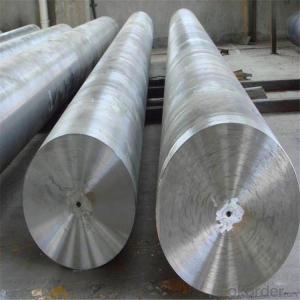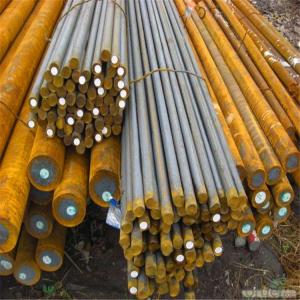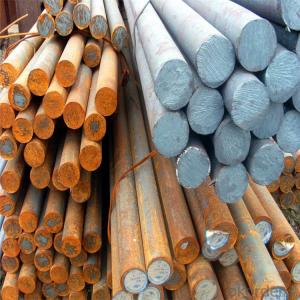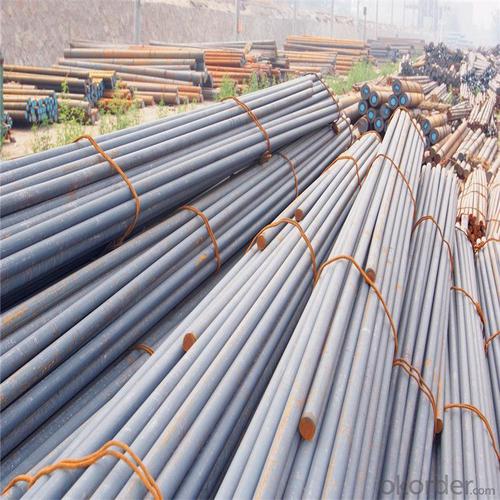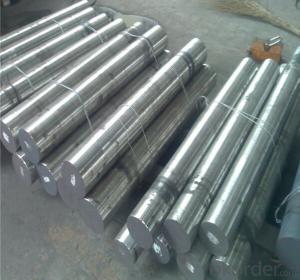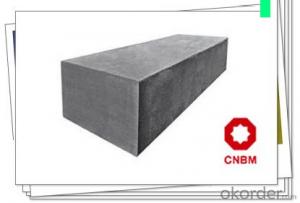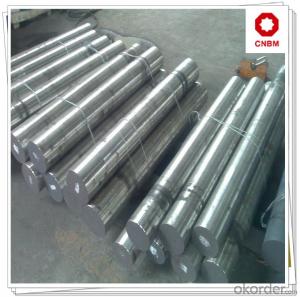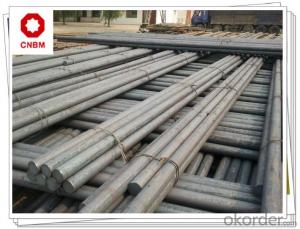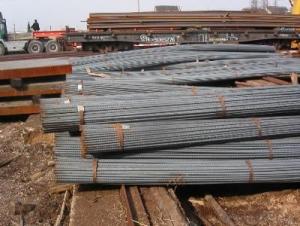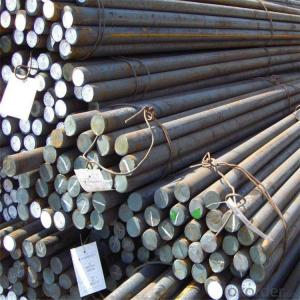ASTM1020 Carbon Structural Steel SAE1020 Steel Bar
- Loading Port:
- Tianjin
- Payment Terms:
- TT OR LC
- Min Order Qty:
- 25 m.t.
- Supply Capability:
- 500000 m.t./month
OKorder Service Pledge
OKorder Financial Service
You Might Also Like
Specification
ASTM1020 Carbon Structural Steel SAE1020 Steel Bar
Product Description of ASTM1020 Carbon Structural Steel SAE1020 Steel Bar
1. Steel grade: SAE1020, 20#, C22, S20C
2. Length: 6M-12M
3. Diameter: 16mm-300mm
4. Product range: round bar, flat bar, square bar
5. Technique: Hot rolled, forged, cold drawn
Specification of ASTM1020 Carbon Structural Steel SAE1020 Steel Bar
Material | SAE 1020 | Round bar | Dia(mm) | 16-300mm |
Process | EAF + LF + VD + Forged + Heat Treatment (optional) | Length (mm) | Max 12m | |
Heat treatment | Normalized / Annealed / Quenched / tempered | Flat bar | Thickness(mm) | 8-500mm |
Delivery condition | Hot forged +Rough machined (black surface after Q/T)+ Turned (optional) | Width(mm) | 70-200mm | |
Test | Ultrasonic test according to SEP 1921-84 D/d | Length (mm) | Max 12m |
Chemical Composition of ASTM1020 Carbon Structural Steel SAE1020 Steel Bar
C | Si | Mn | Cr | Ni | Cu |
0.17~0.23 | 0.17~0.37 | 0.35~0.65 | ≤0.25 | ≤0.30 | ≤0.25 |
Photo Show of ASTM1020 Carbon Structural Steel SAE1020 Steel Bar
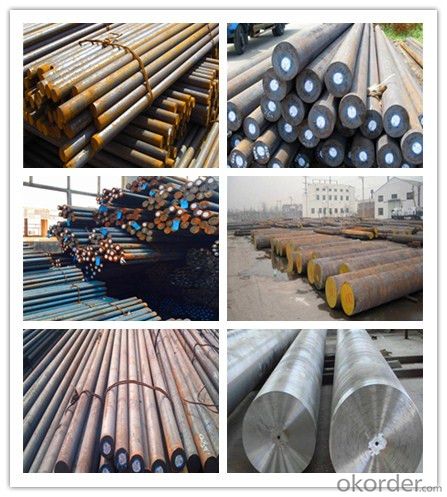
Packing and Delivery:
Packing in bundle package, or as customer's requirements.
Delivery Detail: 45 days after receiving the deposit.
Usage and Applications of ASTM1020 Carbon Structural Steel SAE1020 Steel Bar
1. Steel round bar is used in a large number of architectural and engineering structures. Or it can be used in construction of plants for the production of steel house frames, high-voltage transmission towers, bridges, vehicles, boilers, containers, ships, etc.
2. And we can use this kind of product on the performance of the mechanical parts if the demand is not very high.
3. Some special material steel round bar can be used for main shaft of steamer, hummer shank, with big section and supper force.
Company Information
CNBM International Corporation is the most important trading platform of CNBM group.
Whith its advantages, CNBM International are mainly concentrate on Cement, Glass, Iron and Steel, Ceramics industries and devotes herself for supplying high qulity series of refractories as well as technical consultancies and logistics solutions.


F A Q
1, Your advantages?
professional products inquiry, products knowledge train (for agents), smooth goods delivery, excellent customer solution proposale
2, Test & Certificate?
SGS test is available, customer inspection before shipping is welcome, third party inspection is no problem
3, Factory or Trading Company?
CNBM is a trading company but we have so many protocol factories and CNBM works as a trading department of these factories. Also CNBM is the holding company of many factories.
4, Payment Terms?
30% TT as deposit and 70% before delivery.
Irrevocable L/C at sight.
5, Trading Terms?
EXW, FOB, CIF, FFR, CNF
6, After-sale Service?
CNBM provides the services and support you need for every step of our cooperation. We're the business partner you can trust.
For any problem, please kindly contact us at any your convenient time.
We'll reply you in our first priority within 24 hours.
- Q: What is the difference between a rough turned and a hot rolled steel round bar?
- The manufacturing processes and resulting properties of a rough turned steel round bar and a hot rolled steel round bar differ. To produce a rough turned steel round bar, a steel billet or ingot is heated to a high temperature and then subjected to rough machining processes. This involves removing excess material from the surface to achieve the desired size and shape. The result is a slightly smoother surface compared to the hot rolled bar, although there may still be some minor imperfections. Rough turned bars are often used when a smoother surface finish is required, such as in machining operations. On the other hand, a hot rolled steel round bar is manufactured by heating a steel billet or ingot to extremely high temperatures and passing it through a series of rolling mills. This hot rolling process involves compressing the steel bar between rotating rolls, which reduces the thickness and increases the length. As a result, hot rolled bars have a rough, scaled surface with variations in diameter along their length. This textured surface provides excellent adherence for paint, coatings, or further processing. Hot rolled bars are commonly used in construction, manufacturing, and structural applications where mechanical properties like strength and durability are important. To summarize, the main difference between a rough turned and a hot rolled steel round bar lies in their manufacturing processes and surface finish. Rough turned bars undergo rough machining for a smoother surface, while hot rolled bars are formed through high-temperature rolling, resulting in a rough, scaled surface. The choice between these two types of bars depends on the specific application and the desired properties, such as surface finish, strength, and adherence.
- Q: What is the maximum weight that can be lifted using a steel round bar as a lifting rod?
- The lifting capacity of a steel round bar depends on several factors, including its diameter, length, material composition, and lifting technique. Different steel round bars have different load-bearing capacities based on their dimensions and grade. Engineering principles and specific formulas can be used to calculate the load-bearing capacity of a steel bar based on its material and geometry. To determine the maximum weight that can be lifted with a particular steel round bar, it is important to consider its ultimate tensile strength, yield strength, and factor of safety. The ultimate tensile strength represents the maximum stress the material can handle before failure, while the yield strength is the stress at which permanent deformation occurs. The factor of safety is a design parameter that takes uncertainties into account and ensures structural integrity. To obtain accurate and reliable information about the load-bearing capacity of a specific steel round bar, it is crucial to consult engineering references, standards, or professionals. They can provide the necessary calculations, considering the bar's diameter, length, material properties, intended lifting application, and safety requirements. In conclusion, the maximum weight that can be lifted using a steel round bar as a lifting rod depends on various factors and cannot be determined without considering the specific characteristics of the bar and the lifting scenario. Consulting engineering resources or experts is essential to ensure safe and accurate calculations.
- Q: Can steel round bars be used in the agricultural machinery industry?
- Yes, steel round bars can be used in the agricultural machinery industry. Steel round bars are commonly used in the manufacturing of various components and parts for agricultural machinery such as tractors, harvesters, and tillage equipment. They provide strength, durability, and resistance to wear and tear, making them suitable for the demanding conditions in agriculture.
- Q: Can steel round bars be used for making transmission components?
- Steel round bars are a suitable choice for the fabrication of transmission components. Steel is extensively utilized in the manufacturing sector due to its exceptional strength, durability, and resistance to deterioration. In the production of transmission components like gears, shafts, and couplings, it is customary to employ round bars made of steel. These steel round bars are typically shaped through machining or forging and subsequently subjected to heat treatment to enhance their mechanical attributes. By utilizing steel round bars, the transmission components become capable of enduring substantial loads, facilitating seamless power transmission, and exhibiting an extended lifespan.
- Q: What are steel round bars?
- Made from steel, steel round bars are long, cylindrical metal bars that find applications in various industries such as construction, manufacturing, and engineering. Renowned for their strength, durability, and versatility, these bars are produced through a hot rolling process. This involves heating a solid steel billet and passing it through a series of rollers to achieve the desired shape and size. Available in a range of sizes and grades, steel round bars possess different properties depending on their specific application. They serve as structural components in buildings, shafts in machinery, support bars in concrete structures, and raw material for the production of other steel products. The construction and manufacturing sectors widely prefer steel round bars due to their high tensile strength and corrosion resistance.
- Q: What is the difference between a rough turned and a polished steel round bar?
- A rough turned steel round bar has undergone a preliminary machining process that removes surface imperfections and excess material, providing a slightly smoother finish. On the other hand, a polished steel round bar has undergone further polishing or grinding processes to achieve a much smoother and aesthetically appealing surface finish.
- Q: Will the three steel is steel? It is a steel bar?
- Thread steel through the material is divided into two grades of steel (HRB335), three grades of steel (HRB400), which is now commonly used name, but also seismic steel (HRB400E) and so on. Grade 1 steel is wire, and the building materials are Q235 and HPB235. Other wire materials are for industrial use.
- Q: Are steel round bars available in different diameters?
- Yes, steel round bars are available in different diameters. Steel round bars come in a wide range of diameters, ranging from small sizes like 1/8 inch (3.175 mm) to larger diameters such as 12 inches (304.8 mm) or even more. These different diameters cater to various applications and industries, allowing for flexibility in choosing the appropriate size for specific projects or requirements.
- Q: How are steel round bars used in the manufacturing of material handling equipment?
- Steel round bars are commonly used in the manufacturing of material handling equipment due to their strength and durability. These bars are often used as components in the construction of various equipment, such as cranes, forklifts, conveyors, and hoists. One of the primary applications of steel round bars in material handling equipment is for the construction of load-bearing structures. For example, in cranes and hoists, steel round bars are used to create the mast, boom, and jib, which need to withstand heavy loads and provide stability. The high tensile strength and resistance to bending of steel make it an ideal choice for these critical components. Additionally, steel round bars are used for shafts and axles in material handling equipment. These components play a crucial role in transmitting power and torque, allowing the equipment to operate efficiently. Steel's ability to withstand high stress and torsional forces makes it a suitable material for these applications. Another common use of steel round bars in material handling equipment is for the fabrication of lifting attachments and hooks. These bars are often shaped and welded to create the required lifting mechanism, ensuring that they can safely lift and transport heavy loads. The strength and rigidity of steel make it capable of withstanding the forces exerted during lifting operations. Furthermore, steel round bars are used in the manufacturing of conveyor systems. These bars are utilized as rollers or shafts to support and guide the movement of materials along the conveyor belts. The smooth surface of the steel bars reduces friction, allowing for efficient material handling. In summary, steel round bars play a vital role in the manufacturing of material handling equipment. Their strength, durability, and versatility make them suitable for various applications, including load-bearing structures, shafts, lifting attachments, and conveyor systems.
- Q: What are the different types of steel round bar alloys for improved wear resistance?
- There are several different types of steel round bar alloys that are specifically designed to improve wear resistance. These alloys are formulated to have enhanced hardness and toughness, making them suitable for applications where the material is subjected to constant friction or abrasive forces. One common alloy is tool steel, which includes variations such as H13, D2, and A2. Tool steel is known for its high hardness, excellent wear resistance, and good toughness. It is often used in applications such as molding and forming tools, cutting tools, and dies. Another alloy for improved wear resistance is stainless steel. Stainless steel round bars are corrosion-resistant and have good strength properties. They are commonly used in applications like food processing equipment, medical devices, and marine components. Abrasion-resistant steel, also known as AR steel, is another type of alloy used for improved wear resistance. AR steel is specially formulated to withstand impact and abrasion, making it ideal for applications such as mining equipment, construction machinery, and material handling systems. Manganese steel is another alloy that provides excellent wear resistance. It is commonly used in applications involving high impact and abrasive wear, such as crusher jaws, railroad crossings, and excavator buckets. Lastly, there are specialty alloys such as chrome-moly steel (chromium-molybdenum) and nickel-chromium alloys, which offer superior wear resistance in specific conditions. These alloys are often used in high-temperature applications, such as aerospace components, power generation equipment, and automotive parts. In summary, the different types of steel round bar alloys for improved wear resistance include tool steel, stainless steel, abrasion-resistant steel, manganese steel, and specialty alloys. Each alloy has its own unique properties and is suited for specific applications where wear resistance is a critical requirement.
Send your message to us
ASTM1020 Carbon Structural Steel SAE1020 Steel Bar
- Loading Port:
- Tianjin
- Payment Terms:
- TT OR LC
- Min Order Qty:
- 25 m.t.
- Supply Capability:
- 500000 m.t./month
OKorder Service Pledge
OKorder Financial Service
Similar products
Hot products
Hot Searches
Related keywords
